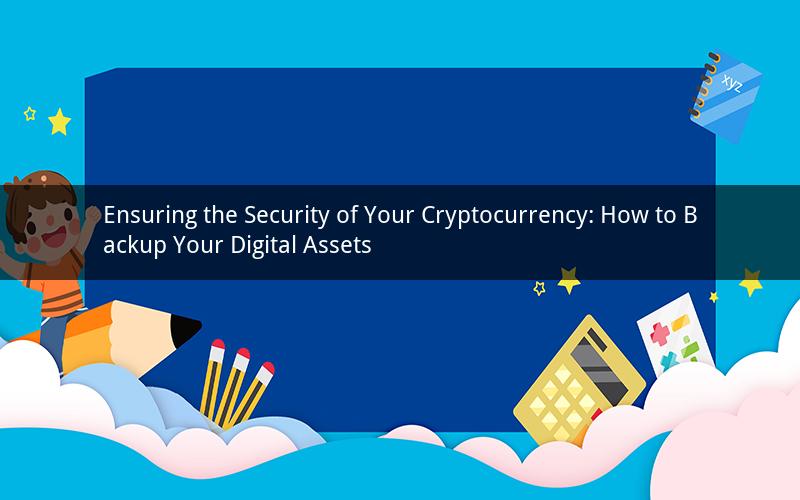
In the rapidly evolving world of cryptocurrencies, the need to secure your digital assets cannot be overstated. With the rise of blockchain technology, digital currencies have gained significant popularity, and with that, the importance of backing up your cryptocurrency has never been greater. This article delves into the various methods of backing up your cryptocurrency and the best practices to ensure the safety of your digital wealth.
1. Understanding Cryptocurrency Backup
Before we dive into the specifics of how to back up your cryptocurrency, it's essential to understand what a backup is and why it is crucial. A backup is a copy of your cryptocurrency wallet's private keys or seed phrases, which allow you to access your digital assets. These keys or phrases are like the passwords to your online bank account, and losing them can mean losing access to your funds.
2. Types of Cryptocurrency Wallets
To back up your cryptocurrency, you first need to have a wallet. There are various types of wallets available, each with its own pros and cons. The most common types include:
- Hardware wallets: Physical devices that store your private keys offline, offering maximum security.
- Software wallets: Digital wallets that can be installed on your computer or smartphone, providing ease of use and accessibility.
- Mobile wallets: Mobile applications that allow you to manage your cryptocurrency on the go.
3. Backup Methods for Cryptocurrency
Now that we've discussed the types of wallets, let's explore the different backup methods for cryptocurrency:
a. Writing Down Private Keys
One of the simplest ways to back up your cryptocurrency is by writing down your private keys. This method requires you to store the keys in a secure location, such as a safe deposit box or a fireproof safe. However, it is crucial to keep the paper with the keys away from your computer or any device that could be hacked.
b. Using a Seed Phrase
A seed phrase is a series of words that represents your private keys. Unlike private keys, seed phrases are much easier to remember and store. To back up your cryptocurrency using a seed phrase, write it down on a piece of paper and keep it in a secure location. It's essential to store the seed phrase in a way that is not easily accessible to unauthorized individuals.
c. Utilizing Cloud Storage
Another method for backing up your cryptocurrency is by using cloud storage services. Many software wallets offer cloud backup features that allow you to store your private keys or seed phrases securely in the cloud. However, this method requires you to trust the service provider and ensure that your data is encrypted and protected from potential breaches.
d. Hardware Wallet Backup
If you're using a hardware wallet, it often comes with a backup feature. Follow the manufacturer's instructions to create a backup of your hardware wallet's private keys. Store the backup in a secure location, just like you would with paper backups or seed phrases.
4. Best Practices for Backup Security
To ensure the safety of your cryptocurrency backups, follow these best practices:
a. Store Backups in Multiple Locations
Do not keep all your backups in one place. Spread them across different locations to minimize the risk of losing your backups due to theft, fire, or natural disasters.
b. Use Strong Passwords
If you're using cloud storage or any online service for backups, make sure to use strong passwords and enable two-factor authentication for an added layer of security.
c. Regularly Update Your Backup
Keep your backups up to date by updating them whenever you add or remove cryptocurrency from your wallet.
d. Stay Informed
Stay informed about the latest security threats and vulnerabilities related to cryptocurrency backups. This will help you stay one step ahead of potential risks.
5. Frequently Asked Questions (FAQs)
Q1: Can I use the same backup method for all types of cryptocurrency wallets?
A1: Yes, you can use the same backup methods for all types of cryptocurrency wallets. However, hardware wallets have specific backup procedures that you should follow according to the manufacturer's instructions.
Q2: How often should I update my cryptocurrency backups?
A2: It is recommended to update your cryptocurrency backups whenever you make significant changes to your wallet, such as adding or removing funds.
Q3: Is it safe to store my cryptocurrency backups online?
A3: Storing your cryptocurrency backups online can be safe if you use reputable cloud storage services and follow best practices for security, such as using strong passwords and two-factor authentication.
Q4: What should I do if I lose my cryptocurrency backups?
A4: If you lose your cryptocurrency backups, you may lose access to your digital assets. It is crucial to create multiple backups and store them in secure locations to minimize this risk.
Q5: Can I recover my cryptocurrency if I lose my backups?
A5: In most cases, you cannot recover your cryptocurrency if you lose your backups. However, some wallets may offer recovery options, such as the ability to import your seed phrase into a new wallet. It is essential to create and store backups meticulously to avoid such situations.
In conclusion, backing up your cryptocurrency is an essential aspect of managing your digital assets. By following the outlined methods and best practices, you can ensure the security and accessibility of your cryptocurrency, even in the face of potential risks and threats.